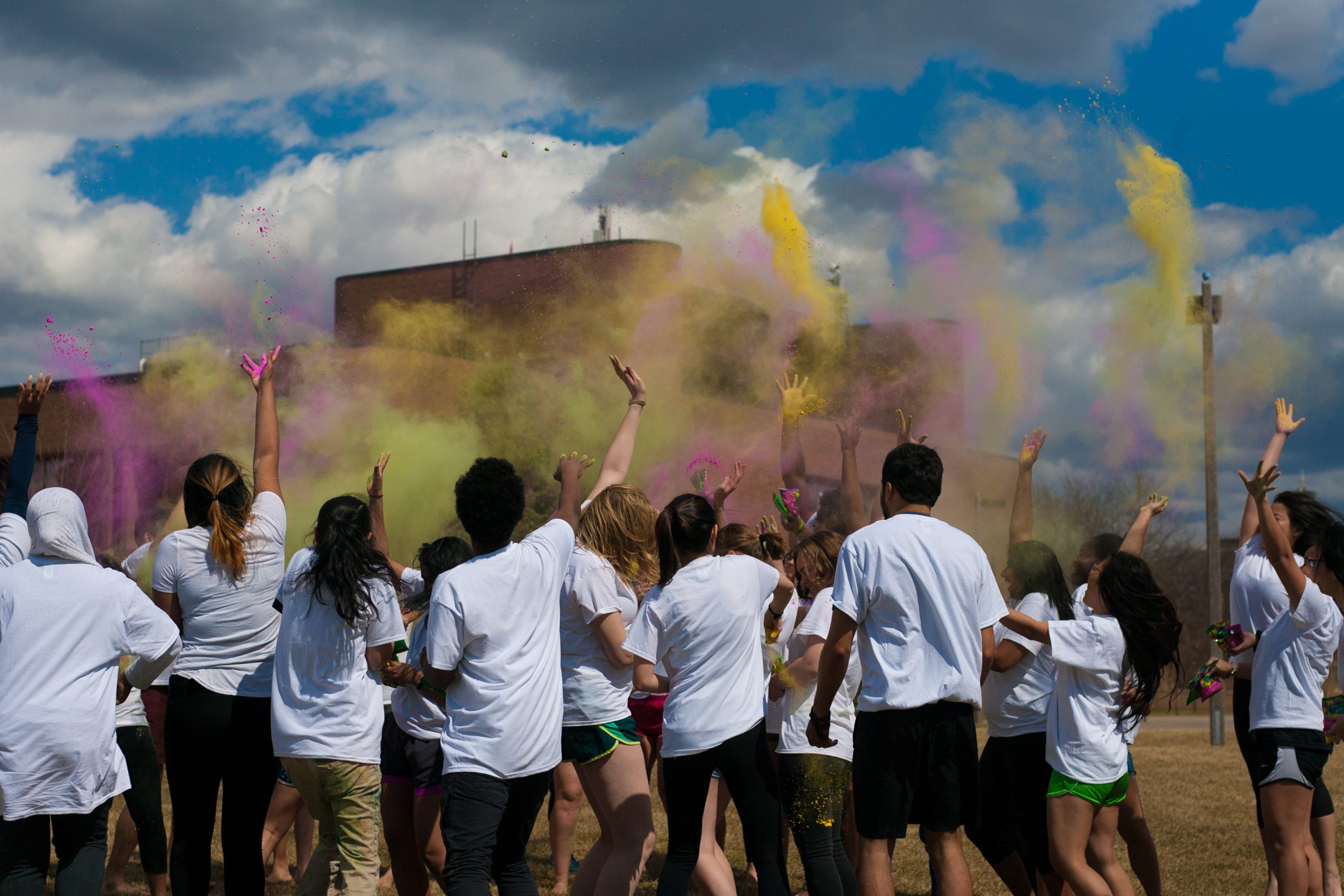Gustavus brought Hindu tradition to its campus last week for Holi, the festival of colors. This event originates in India and involves gathering together and throwing organic colored powder at the people around you and into the air to celebrate the beginning of the new season and commemorate the religious events of Hindu mythology.
“I learned the depths of meaning [Holi] has and how it is aimed to portray compassion, love and joy,” Junior Maripaz Alvarez Tostado Gonzalez Mendez , member of the International Cultures Club (ICC) and the Diversity Leadership Council (DLC) said. “I think that for me, Holi now means the balance of of those three, as well as the active demonstration of love for our community.”
The colored powder represents spring’s abundant colors and a farewell to winter, while the bonfire is lit in memory of the escape of young Prahlad, who worshiped the god Vishnu; when Prahlad refused to worship his father, King Hiranyakashipu, because of his belief in Vishnu, the god saved him from burning in a fire created by his aunt, Holika, thus giving the festival the name “Holi.”
The bonfire represents the triumph of good over evil, of Prahlad over Hiranyakashipu.
“I think that it brought a new, exciting, cultural event to campus because it incorporated a fun, cultural tradition and a typical American tradition (water balloons). It allowed individuals who had never even heard about Holi and for people who have never been able to celebrate it to participate,” co-president of the ICC and Junior Tenzin Jangchup said.
The festival begins with a night of dance and rituals around a bonfire, followed by a day of throwing color and water at the people around you.
People gather in streets and in public places, playing instruments, singing, and dancing. On the second night, the people clean up, dress up, and enjoy time with their families and friends.
Each color symbolizes different parts of the tradition: red symbolizes love and fertility; yellow is the color of turmeric, a powder used as a natural remedy in India; blue is a symbol of the Hindu God, Krishna; and green symbolizes new beginnings.
According to TIME, the colored powder originates from another Hindu story of Krishna and Radha: “Krishna, who has blue skin, is in love with Radha. With Krishna unhappy with the difference in skin color, Krishna’s mother suggests he colors Radha with paint, leading to the colorful powder celebration.”
Also, a big custom of Holi is the loosening of the strictness of social structures (including age, sex, status, and caste); because many people of different races and backgrounds come together to celebrate Holi, it becomes a way to close the social gaps and bring people together.
According to Alvarez Tostado Gonzalez Mendez, the organizations want everyone to feel welcome.
“We hope that students from all backgrounds, either if they identify as part of the diverse community or not, know that they are welcome and encouraged to attend our events. These events are not for a particular group of people, we are aiming to allow all students to feel like they have a special space in all we do.”
The tradition of Holi caught the attention of Europeans during the 17th century and is currently celebrated all over the world today in countries like the United States, Canada, Jamaica, Malaysia, South Africa, and the United Kingdom.
“I think this is a small step into something that will hopefully become a well-known event around campus in the future. We are working hard to try to not only have this as a way of entertainment, but mainly as an educational tool through active experience,” Alvarez tostado Gonzalez Mendez said.
Students and visitors enjoyed the event despite the wind and cold weather.
“I heard a lot of positive feedback after the event and I thought the event went really well,” Jangchup said. “Other than the weather, all the supplies, food, and people showed up on time and it went rather smoothly… We put in a lot of effort for this event to be successful and it is nice that more people can learn about what Holi is and possibly participate in the future!”
Alvarez Tostado Gonzalez Mendez agreed.
“The people that participated were extremely helpful and open to understand it’s true meaning. And I think that the elements of balloon fighting and food that we added at the end really helped to wrap it up in a fun and enjoyable way,” Alvarez Tostado Gonzalez Mendez said.
